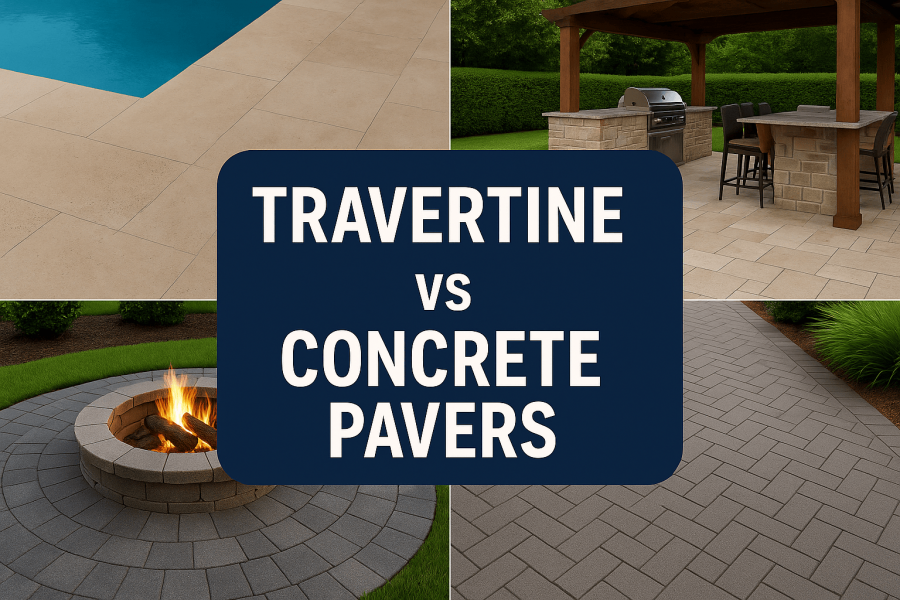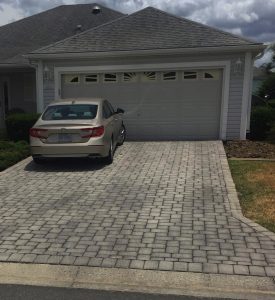- >
Pavers vs Concrete
- By: Garrett Denmark
- Date: May 24 2022
Similar Articles
Artificial Turf vs Sod for Lawns, Backyards & DIY Makeovers
Thinking about artificial turf or sod? Discover the pros and cons of each—from cost and maintenance to durability and pet-friendliness—so you can choose the best option for your lawn or backyard project.
Travertine vs Concrete Pavers for Florida Pool Decks, Patios, Fire Pits & More | bhild
Compare travertine and concrete pavers for Florida pool decks, patios, and driveways — from heat retention and slip resistance to cost, maintenance, and curb appeal.
Beat the Heat: Florida Summer Landscape Survival Guide
Beat the Florida heat with smart summer landscaping. From drought‑tolerant plants to shaded retreats, this guide covers designs, materials, and maintenance tips to keep your yard thriving all season long.
Pavers vs Concrete
While some may find the difference between pavers vs concrete insignificant, there are many considerable distinctions between the two. This article will cover the key differences between pavers vs concrete to allow you to make the best decision when choosing which material for your patio, driveway, or DIY project.
Paver vs Concrete – Customization
Pavers Customization
Pavers are a great option for any new project because they allow a great deal of customization for the homeowner. Most pavers come in many varieties like natural stone, paving stones, paving bricks, and concrete pavers. Since pavers have so many different colors and materials to choose from they can offer any desired pattern and create a more pleasing aesthetic for your outdoor space. Choosing pavers for your new driveway or patio projects not only offers homeowners curb appeal by being more visually appealing but also gives more value to your house.
Typical Concrete Slab Customization
When pouring concrete slabs you still have some options, as far as choosing the right decorative concrete, but are slightly limited with how visually appealing you can make your outdoor space. Most homeowners choose between poured concrete slabs or stamped concrete slabs when constructing their new concrete driveways or concrete patio.
Pavers vs Concrete – Longevity
When properly installed, pavers tend to last longer than typical concrete slabs. The upfront cost of paver installation is typically higher, but the low maintenance and minimal repairs for pavers have lower long-term costs, making them the cost-effective option for most homeowners. Poured concrete slabs have a lower upfront cost for the initial installation process. However, as the poured concrete ages it is much more likely to fade or for cracks to occur in the entire slab. When concrete cracks occur it can allow for weed growth or depending on how greatly affected the concrete surface is by the crack, it may need expensive repairs. Unlike pavers, where you can replace individual pavers, repairing concrete can be a labor-intensive process because you may have to replace an entire single slab of concrete.
Steps to take to make pavers last longer
Part of the higher installation costs come with the preventative measures taken to help ensure the best paver patio or driveway for the future. One of these measures is laying down a layer of salt as a form of weed killer that helps prevent vegetation from growing up from the ground beneath each individual paver. After proper installation of the pavers, they are coated in a protective sealant that keeps them looking just as new as the day they were put in, even in high foot traffic areas.
Pavers vs Concrete Slabs – Environmental
Environmental advantages are one of the main areas where the difference between pavers and concrete slabs can be seen. When constructing a patio or driveway with paving stones or interlocking pavers they are placed in a manner that allows a very small space between each individual paver. This space allows the patio or driveway surface area to be permeable to water, which is very important because it helps avoid any drainage issues. Stamped concrete or pour concrete slabs are not permeable surfaces and do not allow for proper water runoff, which can lead to flooding of driveways or patios since the surface areas do not allow water to seep through. Pavers not only create less water runoff but also act as a natural filter and improve water quality in the area.
Pavers or Concrete- Overview
When choosing between pavers and concrete for your patio or driveway a homeowner should determine their needs and expectations for the project. Both pavers and concrete provide more curb appeal and resale value for the homeowner.
Initial concrete costs tend to be lower than pavers installation when pouring large square foot areas. Pavers tend to last longer and look better, giving the homeowner more customization with different colors and patterns to choose from. However, when pouring concrete slabs a homeowner can choose stamped concrete to have a more appealing patio or driveway but are much more limited when it comes to customization.
The higher costs of material and installation with choosing pavers for your patio or driveway may sway some to choose concrete instead, but lower maintenance and repair costs can make it the most cost-effective option in the long run. Pavers patios and driveways are also permeable surfaces so they do not retain water, unlike concrete which allows runoff and in some cases flooding.











